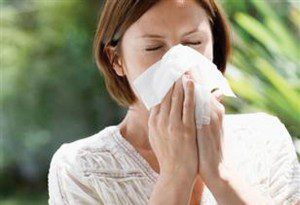By Leela Lavasani MD –


If you are allergic to pollens, your symptoms are worse from January to June in the southeast. This is when our trees are in full bloom. There are four trigger foods that could be affecting you: apples, carrots, celery and peaches. However, we have found that eating local raw honey made from bees that that feed on our local pollens can help decrease your symptoms. To maximize your effect from this, a small amount of honey should be incorporated into your diet on a daily basis.
Grasses tend to make their resurgence here from April to September. Although, it definitely looks lovely when our environment is greener, you may not get to enjoy your surroundings when you are stuck inside. Tomatoes and melons are the two main culprits that have been shown to cross react with the grasses. Unfortunately, this time frame is also the period these two foods are in season.
June through August is the time frame that the molds are most troublesome. These are particularly bad in southern Florida, as we have a lot of rainfall here. Molds tend to flourish in moist environments. Eliminating mold from your diet can make a significant change in your symptoms. Foods that are high in mold content include dried fruit, cheese, vinegar, mushrooms, wine and beer. It is also important to avoid left over foods that have been refrigerated over 24 hours.
Weeds tend to bother us from August to November. There are many different strains of weeds that can bother you, but the two most common strains are ragweed and mugwort. Often when you are allergic to one of these you will be allergic to both, but we do see people that are selectively allergic to different weeds. Ragweed sufferers should avoid cantaloupe and other melons, bananas, and tomatoes. People allergic to mugwort weeds should avoid carrots, celery, coriander, and fennel.
If you are unsure of what you may be allergic to, you may benefit from allergy testing. Sometimes, no matter how strict we are with what we eat, taking our medications regularly, and using our nasal sprays, our symptoms still interfere with our life. The gold standard of treatment of our allergies is immunotherapy, which involves teaching our bodies that these allergens are not harmful and not to have a bad response to them. Immunotherapy, which can be done by weekly shots or by daily sublingual drops, is a time commitment but is very effective. If you feel that allergy testing may benefit you, contact your primary care physician, so that they can refer you to a specialist that can help you.
Leela Sanamme Lavasani, MD
Dr. Leela Lavasani earned her Doctor of Medicine from George Washington University, Washington, DC., in June 2006. Following receipt of her degree, she completed five years of otolaryngology residency training at Thomas Jefferson University, Philadelphia, in June of 2011. Dr. Lavasani is Board Certified by the A.B. of Otolaryngology. Her goal is to provide each patient that she treats with compassion and quality care.
Call 239-348-4081 to schedule an appointment
 Southwest Florida's Health and Wellness Magazine Health and Wellness Articles
Southwest Florida's Health and Wellness Magazine Health and Wellness Articles
